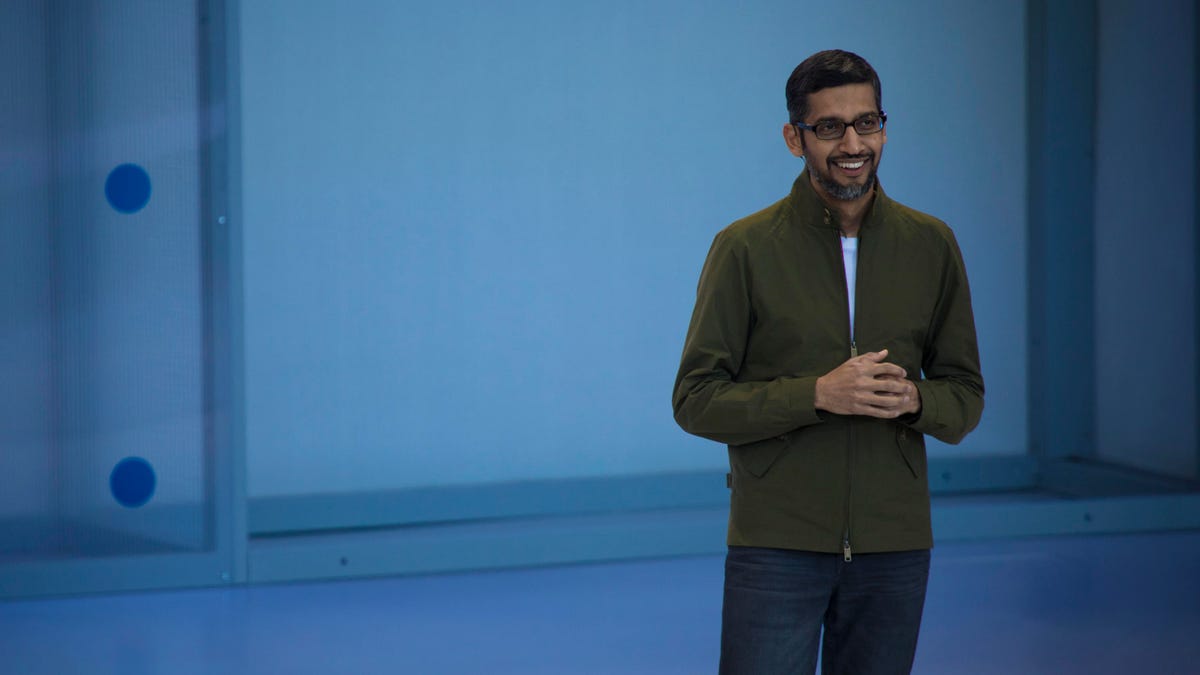Google's CEO will testify before Congress on Dec. 5
Sundar Pichai skipped a high-profile tech hearing in September.

Google CEO Sundar Pichai.
Google CEO Sundar Pichai is headed to Washington.
Pichai is scheduled to appear before the House Judiciary Committee on Dec. 5 for a hearing on Google's perceived bias against conservatives, according to a source familiar with the plan. The Washington Post first reported the news late Tuesday.
It'll be Pichai's first congressional hearing. In September, the search giant's CEO skipped a high-profile tech hearing that included Facebook COO Sheryl Sandberg and Twitter CEO Jack Dorsey. Next to Sandberg and Dorsey was an empty chair and a name tag that said "Google." Both Pichai and Larry Page, CEO of Google parent Alphabet, were invited but neither showed up.
Their absence drew widespread anger from lawmakers.
Google and Pichai have been under intense scrutiny from Washington, with the company being hit with allegations of political bias. In August, President Donald Trump accused Google of political bias and having a liberal bent. He tweeted that Google's search results are "rigged," saying the company is "suppressing voices of Conservatives." He also tweeted a video claiming Google promoted former President Barack Obama's State of the Union addresses every January but not his. Trump added the hashtag #StopTheBias.
Google rejected the president's claim, saying its home page did promote Trump's address in January. The company also explained it didn't promote either Trump's or Obama's address from their first years in office because those speeches aren't technically considered State of the Union addresses. A screenshot from the Internet Archive, which keeps a record of what appears on web domains, backs up Google's explanation.
More broadly, Google has been dealing with other controversies. Earlier this month, 20,000 Google workers from offices around the world walked out in protest of the company's handling of sexual harassment claims against prominent executives.
Google has also been roiled by reports about Project Dragonfly, the company's apparent plan to build a censored search engine for China, eight years after initially retreating from the country. At the time of the departure, Google co-founder Sergey Brin, who grew up in the Soviet Union, cited the "totalitarianism" of Chinese policies.
Google has said its search efforts in China are only "exploratory" and that the company is "not close" to launching a search product there. Google hasn't given many other details about the project. However, last month Keith Enright, Google's chief privacy officer, confirmed during a hearing with the Senate Commerce Committee that there is indeed a Project Dragonfly, but he wouldn't elaborate.
Pichai, meanwhile, has been trying to mend Google's relationship with the federal government. The CEO reportedly went to Washington in September to meet with lawmakers including Kevin McCarthy, a Republican from California, in closed-door meetings.
Google didn't immediately respond to a request for comment.
CNET's Holiday Gift Guide: The place to find the best tech gifts for 2018.
Special Reports: CNET's in-depth features in one place.

